- Homepage
- Easy LUNCH
- Summer Vegetable Garden
Summer vegetable garden
This summer vegetable garden is for a moderate, wet climate; and not one that is very hot and dry. To be more specific we are discussing the eastern-part of South Africa, at an altitude of 4000 feet.
The temperatures reach into the 30s Celsius, with frequent heavy-mists and plenty of summer rain. Corn in flower is the order of the day around Christmas.
Quick guide
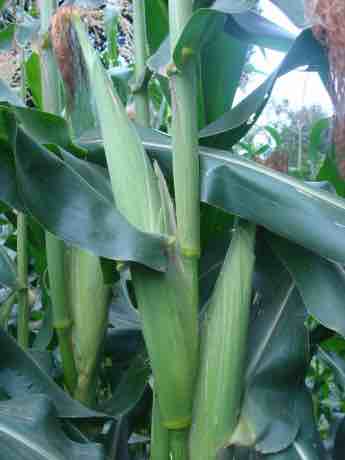
This page was last updated by Bernard Preston on 8th November, 2025.
Interestingly though we grow many of the same veggies that we enjoyed forty-years ago in Chicago in our summer garden whilst undergoing my training to be a DC.
None of the normal tomatoes alas but we do have a cherry variety that is resistant to the blight. We refuse to expose ourselves to toxic-poisons.
On the subject of joint manipulation, I find it essential both for myself and my patients that we always do some lower back exercises before venturing into the summer vegetable garden; that is great preparation for the hard physical work and a lot more interesting than the gym. Some stretching first is really important.
Otherwise you will be consulting your DC more often than will please you.
Summer vegetable garden
It is a time of hard physical work; compost piles have to be turned and the raw humus trundled out in wheelbarrows to where it is going to be needed for the spring garden.
There is also a lot of weeding to
be done, either on hands and knees or with a hoe. Look upon it as an
irritation or perhaps as a time of quiet; with the arms busy but the
mind and spirit free to venture forth into other realms. The cellphone remains firmly switched off.
"If you have a garden and a library, you have everything you will ever need."
- Marcus Cicero, Roman politician, lawyer and orator
Natural pest management
The introduction of chickens to our garden has meant a lot less
weeding this summer; they scratch many of them out. It is a big part of our natural
pest management; they love cutworms.
This week we are enjoying the first of the summer maize; corn on the cob is one of our favourites. In autumn the hens follow me in great anticipation as I lift the old stalks; mealie borer larvae are abundant amongst the roots.
Is maize fattening?
In case you are anxious about maize being fattening, the glycemic index is only 48. That is low, meaning it is only turned very slowly into blood sugar; and provokes no insulin rush.
And that figure is for
sweet corn. The maize that we mostly enjoy will have an even lower GI.
Do you know about the "subsequent meal effect" of whole grains and
legumes; it is a very interesting subject[1].
The
first crop of pole beans is nearly over and the second is well in
flower; legumes are important in our home, both in summer and winter to
reduce our dependence on red meat for protein. There is no doubt now,
it is associated if you eat too much with neoplasms. Grass-fed organic beef may be different; if you can get it.
And what is too much? We enjoy red meat perhaps once or twice a week and I believe that is reasonable; it is known as the flexitarian way of enjoying food.
New potatoes are a joy
No doubt about it, your spuds get a lot of bad press. Indeed from cold storage and depending how you cook them they are for many a total disaster; microwaved, baked and deep-fried they are a direct route to obesity and type-2 diabetes.
But wait, new potatoes are a joy for the healthy nut. Rich in fibre, important nutrients and minerals they contain large amounts of resistant starch; they are not fattening. You don't even need to peel them.
Summer vegetable garden
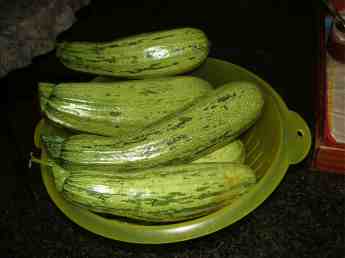
Protection against macular degeneration with zucchini
The summer vegetable garden speaks to a plethora of fresh produce for the table; prevention of disease will always remain better than a cure.
Getting sufficient lutein and zeaxanthin, the two carotenoids deeply involved in preventing age-onset macular degeneration, is high on our agenda; that means zucchini summer squash, corn and plenty of dark green leafy vegetables like kale and Swiss chard.
Zucchini is notable in being able to supply both lutein and zeaxanthin. Five million Americans are needlessly blind because of a deficiency of these vital phytochemicals; and many times that are unnecessarily partially sighted.
We would really like to avoid the white cane and a dog for the blind, so we are enjoying the fruit from the first planting of zucchini back in spring and the second is not far behind it; we hope to have them right through the summer vegetable garden and into late autumn.
Pole beans are far more prolific
The first crop of pole beans are sadly nearly over; we have enjoyed the fruit for the last six weeks; they were planted by my grandchildren as a birthday present in mid-August. Yes, it is a long wait.
But the second crop is in flower right now; and the third about a foot high. We are really committed to more vegetable protein; it is either that or a malignancy says the World Health Organisation. If you do not believe me, google it.
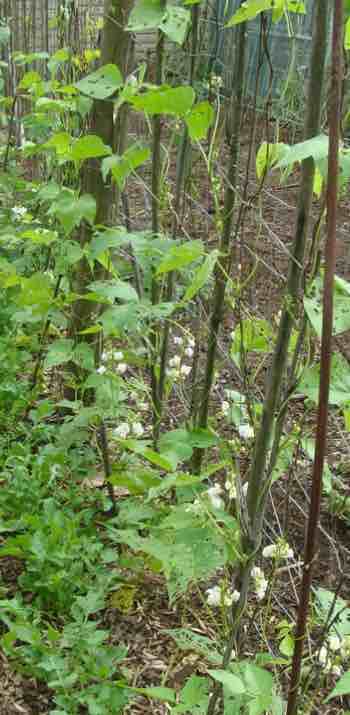
We will be enjoying these pole beans within a few weeks; that is rocket, also known as arugula, growing on the left.
One of the surprises this year is that one actually can grow broad beans in the summer vegetable garden. This plant is self-sown. Notice the stout bamboo poles to support the shoots once they are heavy in fruit.
My journey with broad beans started with just how awful they can be if not eaten the day they are harvested.
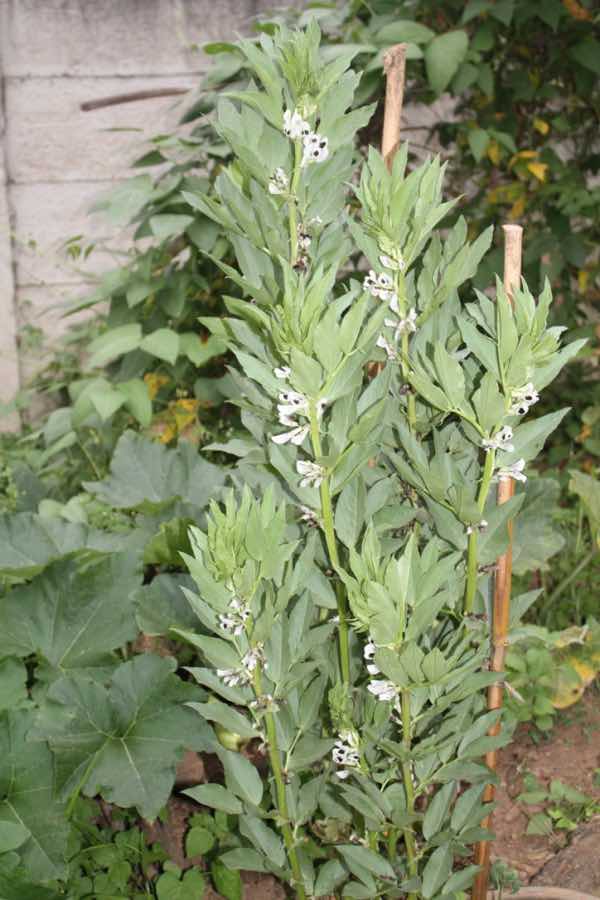
Eat greens daily
Greens are important in every summer vegetable garden; they contain most of the phytochemicals that help prevent, or at least reduce inflammation in the body. This is the season of many different kinds of lettuce, spinach and kale.
What are legumes? Every person concerned about their wellness should be able to give an answer.
I will admit to the Preston family being fruit cakes; we have no desire to go though the pain and disability of metastatic illness. So we eat our greens, very often three times a day.
Eggs Hilton for breakfast is my favourite, enjoyed almost every day; and a green salad for lunch with lettuce, arugula and cilantro. It's smothered with either hummus or pesto; and drizzled with lemon juice and olive oil.
And then there is the kale for dinner, usually cooked with onion, tomato and jalapeno. Our food is unbelievably tasty and nourishing.
Yes we are health nuts yet desperately trying to avoid a serious psychosis called orthorexia that is lurking not far distant; if you find yourself refusing a dinner date because the food might contain this or that, then beware.
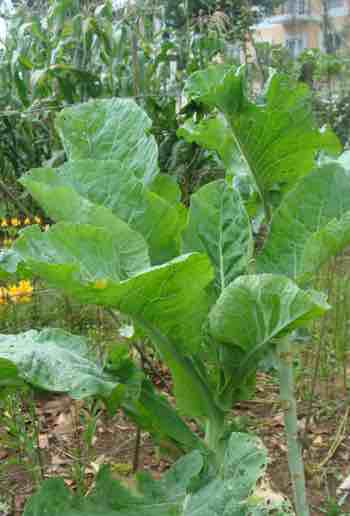
This is spring kale and a summer vegetable garden planting of seedlings will soon be ready to take us through the winter; this isn't Chicago.
The health benefits of kale include scientifically proven protection against many forms of malignancies, including those of the breast and prostate.
Thus we eat it every day; like many legumes and dark-green leafy vegetables it has little flavour and relies on various herbs and spices to make it interesting. Poach an egg on top.
Making a compost pile
Making a compost pile has only one significant cost; the considerable sweat from your brow! But it is an absolutely vital part of the organic summer vegetable garden; grass cuttings and weeds in abundance need a place to be recycled back into the ground. The hotter it gets the better.
Corn stalks at the end of summer make a wonderful foundation for the heap; it needs to aerate.
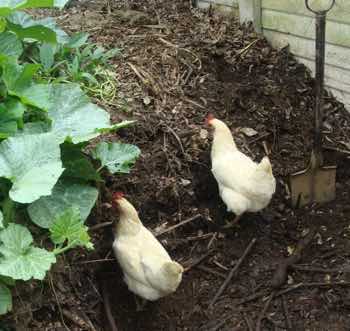
The hens just love coming on a picnic with me when I am opening the compost pile; it is simply loaded with both our indigenous creepy crawlies and the excess produced from the worm farms.
They seek out the cutworms too that used to do so much damage. Natural pest management is important in the garden.
The wonder of worm farms and free range eggs may not be on the agenda in your summer vegetable garden, but keep them in mind for a possibity in the future; they both greatly enrich your food with nutrients.
Just the increased choline and omega-3 are important to your DC; they in different ways help keep generalised inflammation in the body to a minimum.
Rich choline food sources enhance the methylation of toxic homocysteine in the cells; a deficiency also causes birth defects like cleft palate. That is not unimportant, eh?
Easy butternut squash soup
Our easy butternut squash soup recipe is without a doubt our family favourite. By adding coconut cream the glycemic index is lowered even further, making it a non-fattening and very nourishing meal. Our late summer vegetable garden is famous for this prolific vegetable.
A beta-carotene deficiency must be prevented at all costs; it is lethal, literally. It's the precursor of vitamin A; 20 children die every day in South Africa from a deficiency.
Often when fruit or veg grow very large they become insipid; not so butternut squash. The monsters from the compost pile are every bit as good as any other; in fact better in my opinion.
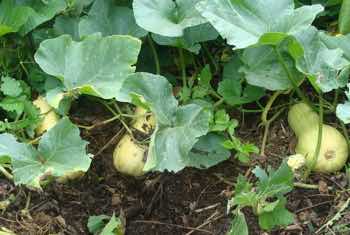
These giant, delicious winter squash growing in the compost pile will soon be turned into the most excellent easy butternut squash soup.
But wait until they their skins turn to a deep nutty brown; when green they are indeed insipid and uninteresting. They also give that feeling of fullness after eating that we all desire; it's called satiety.
I will add more about the herb garden, radishes and a dozen other gems growing in our summer vegetable garden; you start planning yours. Swiss chard and spinach make a very simple, healthy beginning; and a small compost pile in one unoccupied corner of the garden; they do not smell at all if you keep them well aerated. Avoid trying to compact them.
Large gardens mean fences for growing pole beans and limas for example, and making chicken runs. Erecting a vegetable garden fence yourself is not as difficult as you may think.
This garden fence is only just complete for a large chicken run and looks rather bare; by next summer it will have various vines hanging on it, probably passion fruit and gem squash, two more of our favourites.
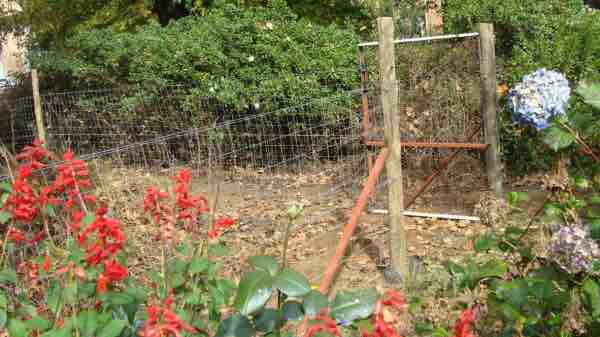
If you do not have the space like we do, then consider these expert tips on how to grow vegetables in containers.
Arugula
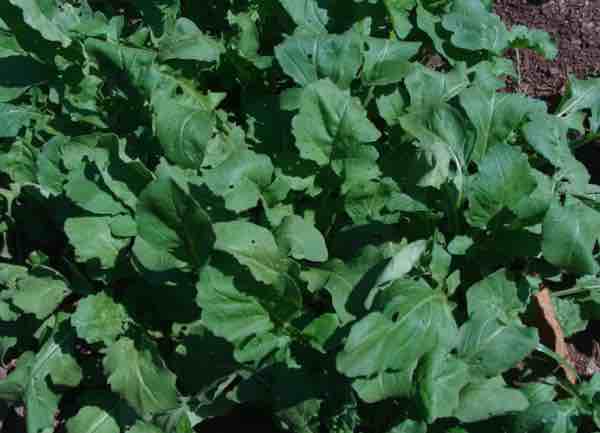
Dark green leafy vegetables are often not at their best in hot and humid summer weather. Arugula, also known as rocket is one of the exceptions. It thrives year round in a mild climate. The summer vegetable garden should always have a couple rows; it is so versatile and easy to grow.
Consider the amazing nutrition of arugula. Plop an egg onto a bed of poached mixed spinach and rocket for breakfast.
Seedlings
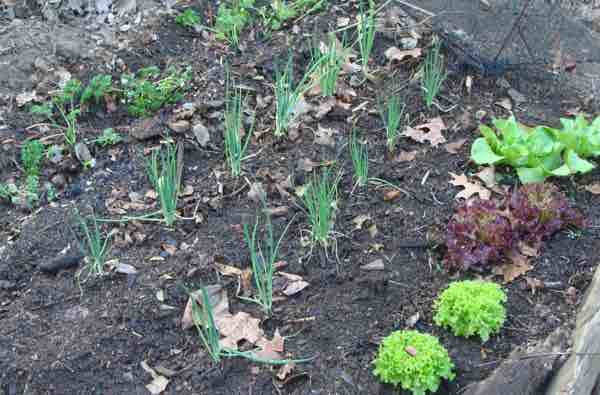
It is a very personal decision whether to save time by buying little plants or save your own seed; in fact we do both.
There are many different varieties of say a cauliflower; your nurseryman knows better than you which grow best in the summer vegetable garden and those that are choice for the colder weather.
Above you can see lettuce, spring onion and parsley seedlings from the nursery; they were only planted a month ago and already we are enjoying a few leaves in our salads. Water them regularly during hot, dry weather. Harvesting the rain is a vital part of our summer vegetable garden.
But beans and peas are so easy to grow from seed.
Growing lettuce is Helen's job and none better than the butter variety from her own seed; they must be kept damp.
If you want abundant soft water for your home and garden, then consider this rain harvesting model.
Late summer is when we plant the winter vegetables in the garden; kale and broccoli for greens. We love freshly-picked young broad beans and green peas for more vegetable protein. Are you committed to better health and eager to avoid nasty tumours and all the cardiovascular diseases? If you think they happen only to other people, then I am afraid I cannot help you.
The summer vegetable garden has so much to offer to easy lunch recipes; freshly-picked is always better.
These are a few musings from the summer vegetable garden; we harvest more than a ton of food from a suburban backyard. I'm not exaggerating; the value is well in excess of R100,000.
Why are peppers so important?
Peppers are a must for even the small garden to my mind; the brightly-coloured fruit means they can simply be put into a flower bed. They are the second richest source of vitamin C which has implications for the prevention of a premature slide into old age. Did you know that British women will on average be disabled for a quarter of their lives?
The connection between frailty syndrome and vitamin C is just a part, albeit a large one of this complex subject.
Growing peppadews is a very popular page at our site. It's so easy but they do need to be staked. The fruit is heavy and will break the plant; then they do not ripen and will not turn to a beautiful red colour.
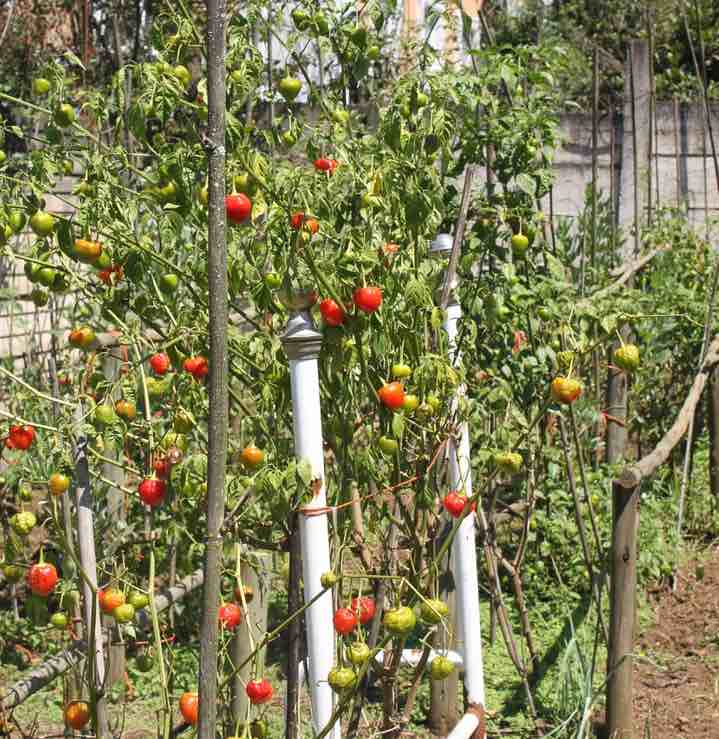
Berries
Berries are a great favourite in most families; not only because they make smoothies for example so much more interesting but also their very high phytonutrient content.
For example the nutritional content of strawberries has a very important role to play in preventing the onset of age-related blindness; that's not "small beer."
Mulberries are another great favourite, especially for my "highly-commended" mead.
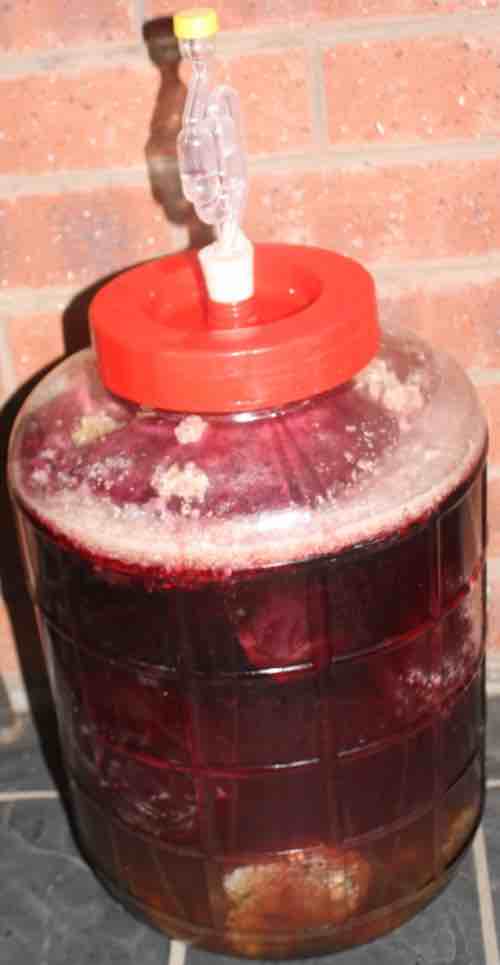
Wear a hat
Sunshine is good for us; it is the best source of vitamin D which is vitally important for our overall well-being. But in the summer vegetable garden it really can be too much of a good thing. Read more about melanomas at acne body wash. In short, wear a hat.
More musings from the summer vegetable garden
So much happens in the summer vegetable garden; one could write a book on the subject.
When browsing use right click and "Open Link in New Tab" or you may get a bad gateway signal.
The material expressed on this page is gleaned from the nutritional and environmental literature; it is clearly referenced. A plain distinction is made between the author's opinion and that which is scientifically proven. When in doubt consult your health professional.
To suggest a correction or clarification, write to Dr Bernard Preston here. Contact.
Newsletter
Our newsletter is entitled "create a cyan zone" at your home, preserving both yourself and Mother Earth for future generations; and the family too, of course. We promise not to spam you with daily emails promoting various products. You may get an occasional nudge to buy one of my books.
Here are the back issues.
- Lifestyle and ideal body weight
- What are ultra-processed foods?
- Investing in long-term health
- Diseases from plastic exposure
- Intensive lifestyle management for obesity has limited value
- A world largely devoid of Parkinson's Disease
- The impact of friendly bacteria in the tum on the prevention of cancer
- There's a hole in the bucket
- Everyone is talking about weight loss drugs
- Pull the sweet tooth
- If you suffer from heartburn plant a susu
- Refined maize meal and stunting
- Should agriculture and industry get priority for water and electricity?
- Nature is calling
- Mill your own flour
- Bake your own sourdough bread
- Microplastics from our water
- Alternative types of water storage
- Wear your clothes out
- Comfort foods
- Create a bee-friendly environment
- Go to bed slightly hungry
- Keep bees
- Blue zone folk are religious
- Reduce plastic waste
- Family is important
- What can go in compost?
- Grow broad beans for longevity
- Harvest and store sunshine
- Blue zone exercise
- Harvest and store your rainwater
- Create a cyan zone at your home
Did you find this page interesting? How about forwarding it to a friendly book or food junkie? Better still, a social media tick would help.
- Homepage
- Easy LUNCH
- Summer Vegetable Garden
Address:
56 Groenekloof Rd,
Hilton, KZN
South Africa
Website:
https://www.bernard-preston.com